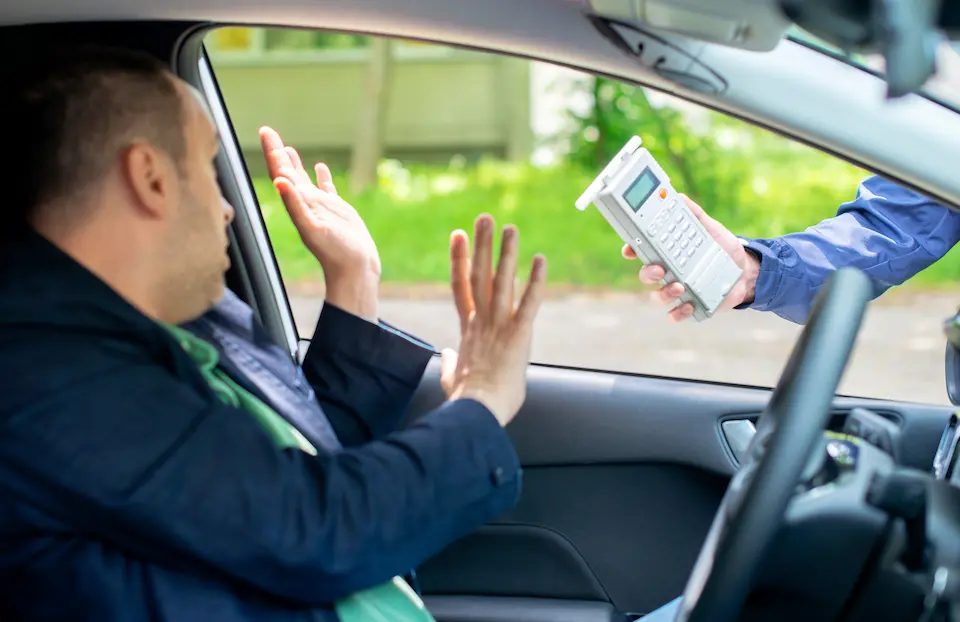
If you've been charged with DWI or DUI, hire an experienced attorney to provide a strong legal defense.
Raleigh DWI Lawyer - Drunk Driving Defense

Criminal Defense Attorney Raleigh, NC
Driving under the influence (DWI) is a serious criminal offense in Raleigh, North Carolina. The state’s DWI laws are strict, and the consequences of a conviction can be severe. If you’ve been charged with DWI, it’s essential to understand the laws and potential penalties.
A Raleigh DWI Lawyer can provide you with legal representation, advice, and guidance throughout the legal process. They can help you navigate the complex court system, negotiate with the prosecution, and protect your rights and interests. At the Law Offices of J.M. Kotzker, P.C., we don’t believe a mistake should negatively affect the rest of your life, and our Raleigh DWI Attorneys are dedicated to fighting on your behalf to help you move forward.

Understanding DWI Law in Raleigh
DWI stands for driving while intoxicated. The state of North Carolina defines DWI as operating a vehicle with a blood alcohol content (BAC) level of 0.08% or higher. It’s illegal to drive while under the influence of drugs or alcohol, regardless of your BAC level.
The state of North Carolina has two types of DWI laws: per se laws and impairment laws. Per se laws make it illegal to drive with a BAC level of 0.08% or higher, while impairment laws make it illegal to drive while under the influence of drugs or alcohol to the extent that you can’t safely operate a vehicle.
Determining DWI in Raleigh, NC
In North Carolina, police officers can pull you over if they suspect you are driving under the influence of drugs or alcohol. Common reasons include:
- Swerving or failing to stay in your lane
- Missing a traffic light or sign
- Reckless driving
- Inability to maintain a safe, consistent speed
Once you have been pulled over, the officer will look for signs of intoxication, such as bloodshot eyes, slurred speech, or the scent of alcohol, and may ask you to get out of the car to perform a series of sobriety tests or submit to an alcohol breathalyzer to determine your blood alcohol content (BAC).
In North Carolina, the legal driving BAC is .08 percent, and for commercial drivers, the level is .04 percent. If you are found to have a BAC exceeding the legal limit, you will be charged with DWI. While there is a difference in North Carolina between a DWI and DUI, in most cases, the circumstances and punishments are similar.
Consequences of A DWI Charge in North Carolina
If you’re facing DWI charges in Raleigh, you’ll face a range of penalties, including fines, jail time, license suspension, and more. The specific consequences you’ll face will depend on the circumstances of your case, including your BAC level, previous DWI convictions, and any aggravating factors.
Some of the common consequences of a DWI conviction in Raleigh include:
- Fines
- Jail time
- Driver license suspension or revocation
- Community service
- Alcohol and drug treatment programs
- Ignition interlock device (IID) installation
- Increased insurance premiums
- Criminal record
Grossly Aggravating Factor
A grossly aggravating factor in DWI cases makes the charges more severe as they compound the crime and include:
- Driving while intoxicated with a minor or disabled person in the car counts as two grossly aggravating factors;
- A previous DWI or DUI conviction within the past seven years of the current charge;
- Driving while intoxicated with a suspended license due to a previous DWI
- Causing an accident in which another person was seriously injured.
Aggravating Factors
Aggravating factors will also make your penalty more severe, but not to the extent of grossly aggravating factors. These factors include:
- BAC of 0.15 or above
- Causing an accident that does not result in serious injury;
- Having two or more traffic violations but no DWIs;
- Driving on a suspended license (but not due to DWI);
- Having a DWI conviction more than seven years old;
Mitigating Factors
A judge uses mitigating factors to lessen the penalty of a DWI and can positively influence your outcome. These include:
- BAC of 0.09 or below;
- Impairment was caused by a legally prescribed medication that was taken in the prescribed manner;
- Having a safe driving record;
DUI Drug and DWI Penalties
The DWI charge and the factors are then used to determine the “Level” of DWI and assign the applicable penalty.
- Level 1A (Most severe): Three or more grossly aggravating factors; minimum 120 days in jail up to 36 months in jail.
- Level 1: Two grossly aggravating factors; minimum 30 days in jail up to 24 months;
- Level 2: One grossly aggravating factor; minimum 7 days in jail up to 12 months
- Level 3: More aggravating factors than mitigating factors; up to six months in jail and possible community service;
- Level 4: Equal amounts of mitigating and aggravating factors; up to 120 days in jail and possible community service;
- Level 5: More mitigating factors than aggravating factors: up to 60 days in jail and possible community service.
There is a wide range of variables that determine the penalty if found guilty of driving while intoxicated (DWI). An experienced North Carolina DWI lawyer will work to highlight mitigating factors and reduce aggravating factors as well as strive to obtain the lowest possible penalty for the level of DWI determined.
The Consequences of an Underage DWI Conviction
North Carolina has a zero-tolerance policy for minors when it comes to drinking and driving and the legal BAC for minors is 0.0 percent. This means that if you are under 21 and found to have any alcohol whatsoever in your system, you are facing a DWI Class 2 misdemeanor with a possible punishment of 60 days in jail and up to a $1000 fine. However, any grossly aggravating or aggravating factors can also affect the punishment.
Your Rights at a DWI Stop In North Carolina
As a driver, you have certain rights during a DWI stop in North Carolina. Some of these include:
- The right to remain silent: You have the right to refuse to answer any questions asked by law enforcement that could incriminate you.
- The right to refuse a breath test: In North Carolina, you have the right to refuse a breath test if you are asked to take one. However, this refusal could result in automatic license suspension.
- The right to an attorney: You have the right to an attorney, and it’s recommended that you exercise this right if you’re arrested for DWI
What to Expect During a DWI Traffic Stop in North Carolina
During a DWI stop in North Carolina, you can expect the following:
- The officer will ask for your license and registration: You are required to provide these documents to the officer.
- The officer may ask questions: The officer may ask you questions to determine if you’re under the influence of drugs or alcohol.
- The officer may ask you to perform a field sobriety test: The officer may ask you to perform a field sobriety test to assess your level of impairment.
- The officer may request a breath test: If the officer suspects that you’re under the influence of drugs or alcohol, they may request that you take a breath test to determine your blood-alcohol level.
Field Sobriety Tests
If you are suspected of driving while intoxicated (DWI), the officer may request to administer a portable breathalyzer test. You can and should consider refusing this and other field sobriety tests as they are often inaccurate and will be used against you in your case. However, the officer may (and most likely will) arrest you for suspicion of DWI, and you’ll be taken to the police station.
At this point, North Carolina General Statute 20-16.2 outlines that driving on state roads falls under “implied consent,” meaning you automatically consent to a blood alcohol test or chemical analysis if you are charged with DWI. Refusal to do this will lead to immediately having your driver’s license revoked for a minimum of one year. However, if you know you have been drinking and may be subject to more severe penalties, it may be beneficial to refuse the test and speak with a DWI lawyer in Raleigh.
How to Stay Safe During a DWI Stop in North Carolina
To stay safe during a DWI stop in North Carolina, it’s important to follow these steps:
- Remain calm and polite: Keep a calm demeanor and be polite when speaking to the officer.
- Know your rights: Familiarize yourself with your rights during a DWI stop so you know what to expect.
- Refrain from making incriminating statements: Don’t make any statements that could incriminate you.
- Call an attorney: If you’re arrested for DWI, it’s recommended that you call a lawyer to represent you.
How a Raleigh DWI Lawyer Can Improve Your Outcome
A Raleigh DWI lawyer can provide you with legal representation and guidance throughout the legal process. They can help you understand the laws and consequences of a DWI conviction and develop a defense strategy to minimize the consequences.
Here are some of the ways a lawyer can help:
- Investigate the circumstances of your case
- Challenge the evidence against you
- Negotiate with the prosecution for a plea deal
- Represent you in court
- Protect your rights and interests
- Provide legal advice and guidance
- Explain the legal process and options available to you
- Develop a defense strategy to minimize the consequences
Raleigh DWI Frequently Asked Questions
What do prosecutors need to prove in a DWI charge in Wake County, North Carolina?
In Wake County, North Carolina, for a DWI (Driving While Impaired) charge, prosecutors must establish beyond a reasonable doubt two essential elements:
- Actual Physical Control: The individual was in actual physical control of the vehicle. This involves proving operation on a public roadway or public vehicular area. Evidence can range from direct observation of driving to circumstantial evidence, such as the car’s engine running or the vehicle’s location at the time of arrest.
- Impairment: The individual was under the influence of alcohol, drugs, or both, to the extent of being “appreciably impaired,” or had a blood or breath alcohol concentration of .08 or higher at a relevant time after driving. This can be demonstrated through chemical testing (blood, breath, or urine tests) or through an officer’s observations, such as slurred speech, bloodshot eyes, or poor performance on field sobriety tests.
In addition to these points, Raleigh DWI defense attorneys stress the importance of understanding the levels of DWI offenses and the mitigating and aggravating factors that can influence sentencing. For anyone facing a DWI charge, it is crucial to consult with a knowledgeable Raleigh DWI lawyer who can navigate the complexities of DWI law and develop a robust defense strategy.
Where can i get a copy of police reports for incidents related to my case in Raleigh, North Carolina?
In Raleigh, North Carolina, obtaining a copy of police reports related to your case can be done through the Raleigh Police Department’s Police Records Division. There are specific steps for accessing different types of reports:
Incident Reports
- Email Request: Send your request to police.records@raleighnc.gov. Include the report number if available and a contact phone number.
- Call: Dial 919-996-3325 to request the report over the phone.
Crash Reports
- Online Access: Crash Reports can be viewed and printed online through the Raleigh Police Department’s website.
Criminal History Reports
- CCBI Requests: For criminal history reports, you need to contact the City-County Bureau of Identification (CCBI).
Service Requests
- Email Request: For general service requests, email the staff at the provided Police Records Division email with details such as your name, email address, phone number, the address or location of the incident, date or date range of service, and the names of any involved persons.
Additional Information
- Requests can also be made for agencies via email or fax using official letterhead to the Police Records Division.
Will I go to jail if I am convicted of a DWI in North Carolina?
In North Carolina, whether you’ll face jail time for a DWI conviction depends on the offense’s severity and any aggravating factors. The state categorizes DWI punishments from Level V (least severe) to Level I and Aggravated Level I (most severe), with jail time ranging from a minimum of 24 hours to a maximum of 36 months for the most serious offenses. Factors such as a high BAC, reckless driving, or previous DWI convictions can increase the level of punishment and the likelihood of jail time. All DWI convictions require substance abuse assessment and treatment, and penalties become harsher with repeat offenses. Consulting with a DWI defense attorney is crucial for navigating the legal implications and seeking the best outcome.
Protect Your Future With An Experienced DWI Attorney
A DWI conviction will follow you for years and can include time in jail, heavy fines, and an inability to find employment or even rent an apartment. You have the Constitutional right to legal representation in your case, and we will fight on your behalf to protect your rights and create a strategy that will lead to the best practical outcome in your case.
Depending on the circumstances, we strive to have charges dropped or reduced, introduce mitigating circumstances, and minimize penalties to help you move forward with your life.
At The Law Offices of J.M. Kotzker, P.C., we are committed to providing the best defense to our clients and have successfully represented thousands of clients.
